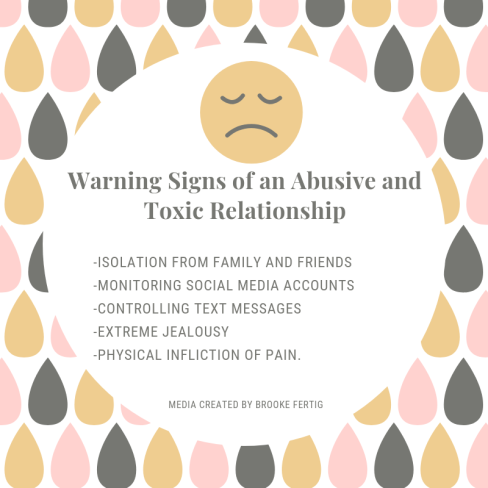
Professor Colleen Lelli believes that knowing the warning signs of a toxic relationship is key. Common warning signs of a toxic relationship are isolation from loved ones, monitoring private accounts, extreme jealousy and the physical infliction of pain.

Knowing the warning signs of a toxic relationship is key. Common warning signs of a toxic relationship are isolation from loved ones, monitoring private accounts, extreme jealousy and the physical infliction of pain, according to a Cabrini University expert on domestic violence.
“Breaking up with an abusive partner can be upsetting and a very difficult decision because the victim loves the person,” Lelli said. “Breaking up with an abuser is much different than breaking up with someone in a healthy relationship.” There are various reasons why people stay in abusive relationships such as conflicting emotions, pressure, distrust of adults and authority and reliance on the abusive partner.
Nearly 57 percent of college students say it is hard to identify if they are experiencing an abusive relationship. Additionally, 58 percent say they would not know how to help someone who is experiencing it. There are serious ramifications when individuals face abusive relationships. They can put the individual at higher risk for substance abuse, further domestic violence, eating disorder and unprotected sexual behavior. About half of individuals who have been victims of dating violence attempt suicide.
In addition to being the associate professor of education at Cabrini University, Dr. Colleen Lelli is the director of

the Barbara and John Jordan center for children of trauma and domestic violence education. The center aims to provide opportunities between professionals and domestic violence advocates while offering methods on how to tackle domestic violence and work with children who have experienced trauma. The center also aims to educate teachers and leaders to work to end violence in the lives of women, men and children. Additionally, the center aims to prepare others to confront issues that are specific to intimate relationships.
Lelli emphasized the importance of “safety planning” when breaking off an abusive relationship. Having a plan in place is a good first step, followed by calling a counselor and organization that specializes in supporting victims of domestic violence.
Safety planning is the creation of actions, strategies and resources that are designed to protect and keep safe the individual during and after leaving an abusive relationship. Though the strategies will differentiate, the ultimate goal is to keep the individual safe from the abuser.
“Victims in dating or domestic violence relationships need support to grow stronger—people who will listen without judgment, believe the victim and offer specific help like forming a safety plan,” Lelli said. “It’s important to be there for them to help them grow stronger.”



